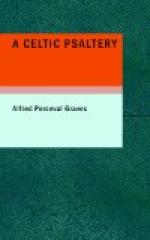And now the three stand ready, full of
tears
To quit the haunts of happy married years,
The tombs that hid their lost ones.
Staunchly then
Naomi spoke her purpose once again:
“Daughters, turn back, each to her
mother’s house
To take the rest that there her work allows,
And in due course a second husband find,
Nor be unto the future foolish—blind!
Yet take a blessing from the heart of
hearts
Of your Naomi ere she hence departs.”
She blessed them, and with voices lifted
up
In loud lament the dregs of sorrow’s
cup
They drained together. Orpah, weeping,
turned
And slowly went, but Ruth with eyes that
yearned
Into Naomi’s, cried aloud in pain:
“Thus to forsake thee, urge me not
again,
Nor to return from following after thee!
For where thou goest, I will surely go.
And where thou lodgest, will I lodge also!
Thy people shall be my people evermore,
And thy God only will I now adore!
And where thou diest, I will buried be!
So may Jehovah strike me with his thunder,
If aught but only death our lives shall
sunder.”
Ruth’s lips have sealed that solemn
covenant,
Then with Naomi hand in hand she went.
But as they slept that night there came
to each
The selfsame vision, though they ne’er
had speech
Thereon, till Obed’s birth, Ruth’s
only son
And David’s grandsire; for they
each saw one
With Mahlon’s aspect seated in the
skies,
And on his knees a babe with Ruth’s
own eyes,
And by the infant’s side one with
a face
Ruddy and bold, a form of Kingly grace,
And in his hand a harp wherefrom he drew
Marvellous music while his songs thereto
Held hosts of angels hearkening in the
blue.
Then figures floated o’er him faint
and far
Up to a Child who rode upon a star,
And in the Heavenly wonder of his face,
They read the Ransom of the Human Race.
THE LILIES OF THE FIELD AND THE FOWLS OF THE AIR
“Consider the lilies!” He
spake as yet spake no man:
“Consider the lilies,
the lilies of the leas,
They toil not, they spin not, like you,
tired man and woman,
Yet Solomon in his glory was
not robed like one of these.
“Consider the lilies! Sure,
if your Heavenly Father
So clothe the meadow grasses
that here flower free of scathe
And to-morrow light the oven, now, say,
shall he not rather
Still of His goodness clothe
you, O ye of little faith?
“Consider the fowls of the air,
behind your harrows;
They plough not, they reap
not, nor gather grain away,
Yet your Heavenly Father cares for them;
then, if he feed the sparrows,
Shall He not rather feed you,
His children, day by day?”
THE GOOD PHYSICIAN
To find Him they flock, young and old,
from their cities,
With hearts full of hope:
for the tidings had spread:
“The proud He rebukes and the poorest
He pities,
Recovers the leper, upraises
the dead.”




